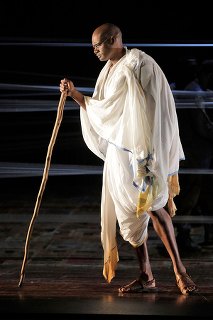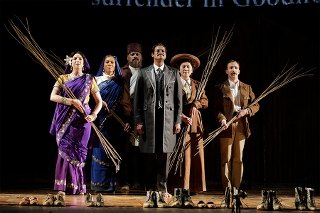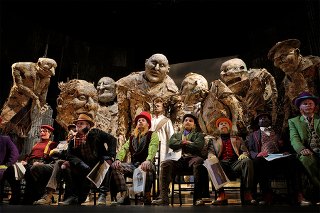|
Back
Devoted to civil disobedience Los Angeles
Dorothy Chandler Pavilion
10/20/2018 - & October 27, November 1, 4, 8, 11, 2018
Philip Glass: Satyagraha
Libretto: (in Sanskrit) by Constance DeJong and the composer from the Bhagavad Gita
Sean Panikkar (M.K. Gandhi), So Young Park (Miss Schlesen), Erica Petrocelli (Mrs. Naidoo), J’Nai Bridges (Kasturbai), Theo Hoffman (Mr. Kallenbach), Morris Robinson (Parsi Rustomji), Niru Liu (Mrs. Alexander), Patrick Blackwell (Lord Krishna), Michael J. Hawk (Prince Arjuna), Los Angeles Opera Chorus and Orchestra, Grant Gershon (chorus director and conductor)
Phelim McDermott (director), Julian Crouch (associate director and set designer), Kevin Pollard (costume designer), Paule Constable (original lighting design), Tony Simpson (lighting designer), 59 Productions (video design), Rob Thirtle (movement and puppetry) 
S. Panikkar (© Cory Weaver)
In the second production of the season, Los Angeles Opera (LAO) turns to ‘minimalist’ persuasions of Philip Glass and his inspirational masterpiece, Satyagraha. Thus, completes the tripartite union, having come down from earlier successes of Phelim McDermott’s eye-popping 2016 Akhnaten, featuring the luminosity of countertenor Anthony Roth Costanzo, and Einstein on the Beach’s innovative kicks in 2013.
Before venturing West, McDermott’s Satyagraha first wound up at The Met in 2008 with an encore in 2011 ahead of which his cerebral investigation delved into how best to convey M. K. Gandhi’s germinal Satyagraha (translated Sanskrit for “truth force.”) When one learns more about events swirling between 1893 and 1914, it’s not difficult to empathize with the director’s summarization: “Sadly, there won’t ever be a moment when this opera isn’t relevant.”...the timing of this work can hopefully move mountains and banish oppressive injustices.
Witnessing performances of The Maid of Orleans (2006) and Salome in 2012, Sean Panikkar hasn’t lost any of his golden vibrancies of firm humility and sincere expression. Striking in resemblance to Mohandas Gandhi, M. Panikkar instantaneously energizes the audience with a mesmerizing equivalency that’s re-emphasized through a repetitive Philip Glass mode with ostinato grounding, using Grant Gershon as the unwavering metronomic controller.
Lessons of civil disobedience (taken from the Bhagavad Gita) are beautifully projected via 59 Productions on either of two of Julian Crouch's organic staples: a corrugated iron semicircular backdrop or parchments of inked protestations found within Gandhi's publication, Indian Opinion. Furthermore, these selections were aggrandized through Gandhi’s philosophical research of introspections by Leo Tolstoy, Rabindranath Tagore and Martin Luther King, Jr.

E. Petrocelli, J. N. Bridges, M. Robinson, S. Panikkar, S.Y. Park,
T. Hoffman (© Cory Weaver)
In turn, the opera unfolds in an unchronological format during the social reformer’s 21-year term in South Africa. If Gandhi is the agent to spark group thought, then this “movement” originally encompasses several key individuals surrounding him. Early on in the opera we hear a wondrous example of how well three female voices can meld into a single register: J’Nai Bridges (Kasturbai) fills the air waves with a richly deep mezzo voice, Erica Petrocelli (Mrs. Naidoo) acts as a balance between the other two [ladies] with bountiful tonality and So Young Park (Miss Schlesen) utilizes her acuities by delivering razor-like high notes as an entrée into downward scales.
Baritone Theo Hoffman had a slow start, but once under the umbrella of a quartet and/or quintet, his Mr. Kallenbach was brilliantly detailed. Despite a broad and authoritative bass timbre, Morris Robinson’s Parsi Rustomji was unable to lift above the orchestra. Similarly, debuting Niru Liu had a difficult time convincing as the defensive Mrs. Alexander, for the mezzo-soprano liquefied into thin air, shattering any possibility of distinguishing herself from the Los Angeles Opera Chorus in Act II.

LA Opera Men’s chorus (© Cory Weaver)
If anyone was in attendance of Così fan tutte back in 2011, he/she would recall the conspicuous lighting detail used to accentuate one of Mozart’s most revered works. We find Mlle. Constable’s original lighting has parallel strengths in Satyagraha that nicely re-align via Tony Simpson, especially when it comes to ingeniously melting scene into scene while magnifying Kevin Pollard's superbly-textured, quasi-nightmarish papier-mâché bobble heads and monsters that are cleverly enlivened under the masterful direction of Rob Thirtle.
LAO’s chorus has a firm commitment to this Philip Glass music: well-balanced, well-blended as a single entity while also being well-meshed amongst other significant principals. It's Grant Gershon who is deserved of maintaining equilibrium and administering unblemished continuity throughout the incessant score.
On a final note, LAO's informational links to learning more about Mohandas Gandhi and this 2018 production, are immensely valuable. Teachings of virtue and elimination of aggression become an “agent for change” in this world of uncertainty. To this reviewer, the words and phrases that stand out are as follows: dignity of honest work, sacrifice, self-restraint, equanimity, inspire, moral duty, faith, self-restraint and serenity. To that extent, we turn and give thanks for Mohandas Gandhi and the peaceful message we’ve experienced through music and voice...then, we must all gives thanks to this Satyagraha...simply luminous with a bright vision of how the world can live in harmony.
Christie Grimstad
|